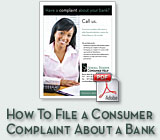"How do I"
know if an email or call from the Federal Reserve is legit?
The Federal Reserve does not directly contact consumers, and you should be suspicious of any unexpected email message claiming that the Federal Reserve is holding money owed to you. The Federal Reserve does not maintain accounts or hold funds for individual consumers. Do not click on any links contained in these types of emails and delete them immediately.
The Federal Reserve Board regularly monitors fraudulent solicitations and communications that purport to involve or be approved by Federal Reserve officials. In addition to emails, these scams can come in the form of letters and phone calls seeking your personally identifiable information that is later used to commit fraud or theft. You should verify the legitimacy of service providers before providing personal financial information or entering into a business transaction. If you suspect your information has already been compromised, contact your financial institution and local law enforcement officials immediately. To file a complaint about a suspected fraudulent email, contact the Federal Bureau of Investigation's Internet Crime Complaint Center at www.ic3.gov.
file a complaint?
First, try to settle the problem directly with your bank or financial institution. This may involve contacting senior bank management or the bank's customer service department. If you cannot resolve the problem with your bank, you may file a complaint directly with your bank's regulator. Find that information using BankFind. You may also file a complaint online with Federal Reserve Consumer Help and we will help direct you to the appropriate regulator.
get answers to other questions?
dispute an error on my credit report?
You may dispute an error on your credit report by contacting either the credit reporting company or the company that provided information about you. The Consumer Financial Protection Bureau provides tips about what to submit with your dispute, contact information for the nationwide credit reporting companies, and options about what to do if your dispute is not resolved to your satisfaction.
get help if I cannot make my mortgage payments?
If you are having trouble making your mortgage payments, one of the most important things you can do is call your bank or mortgage company and ask for help. The federal banking agencies encourage banks and financial institutions to work with consumers who may be unable to make their payments on their home loans. In addition, mortgage crisis and foreclosure prevention help is available through free Department of Housing and Urban Development (HUD) housing counselors. The Consumer Financial Protection Bureau's Mortgage Help site also has information you may find helpful. Finally, check our Foreclosure page for more resources.
get a loan, deposit account or grant from the Federal Reserve Bank?
Federal Reserve Banks do not provide grants or banking services, such as offering deposit accounts or lending money, to consumers. The Federal Reserve provides certain financial services to the U.S. Government, depository institutions, and other financial entities. Learn more about the Federal Reserve and Federal Reserve Banks on the Federal Reserve Education website. Also be aware and learn more about scams related to loans, deposit accounts or grants by visiting the Identity Theft/Frauds and Scams section of this website.
know if my bank is safe?
The Federal Deposit Insurance Corporation (FDIC) will help you determine whether your bank is federally insured and the exact amount of your deposit insurance. If you do business with a credit union, you may contact the National Credit Union Administration (NCUA) for the same information. Generally, individual depositors are insured up to $250,000.
get a free copy of my credit report?
The Fair Credit Reporting Act (FCRA) requires all consumer reporting agencies that operate nationally to give you a free copy of your credit report annually, when you ask for one. The nation's three largest consumer reporting agencies have set up a website, a toll free telephone number, and a mailing address that you can use to order your free annual report:
-
www.annualcreditreport.com
1-877-322-8228
Annual Credit Report Request Service
P.O. Box 105281
Atlanta, GA 30348-5281
voice my opinion about federal consumer protection regulations?
The Federal Reserve Board of Governors (the Board) writes certain consumer protection regulations and asks for public comment on proposed changes. To see a list of the Board's current regulatory proposals, click here. All comments received are posted on the Board's Web site and are considered by Board staff as they make final changes to regulations. You may also provide comments by calling the Board's comment line at (202) 452-3000. Please note that any comments you post on the Board's public Web site will include your name and address, which may be viewed by any Internet user and may be accessed through Web search engines.
Several federal consumer protection laws are implemented by the Consumer Financial Protection Bureau. The Bureau seeks public comment on proposed regulatory changes before they are made. You may see a list of Bureau regulations open for comment and submit comments by clicking here. You may also provide comments by calling the Bureau at (855) 411-2372.
know if my mortgage company is licensed?
The Nationwide Mortgage Licensing System Consumer Access (NMLS Consumer Access) is a free service for consumers to confirm that the mortgage company with whom they wish to conduct business is licensed in their state. NMLS Consumer Access contains licensing and registration information about loan originators.
get information on the interest rate used to calculate my loan payments?
If you cannot find interest rate information in your loan documents or credit card materials, call your lender. Contact information is usually found on your monthly statement or in your payment book.








